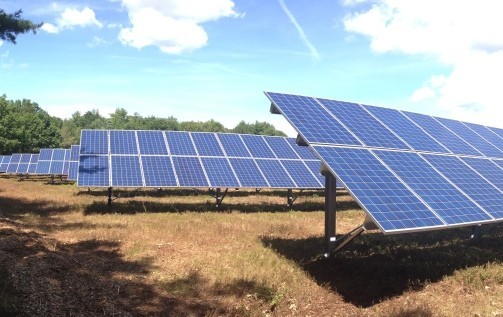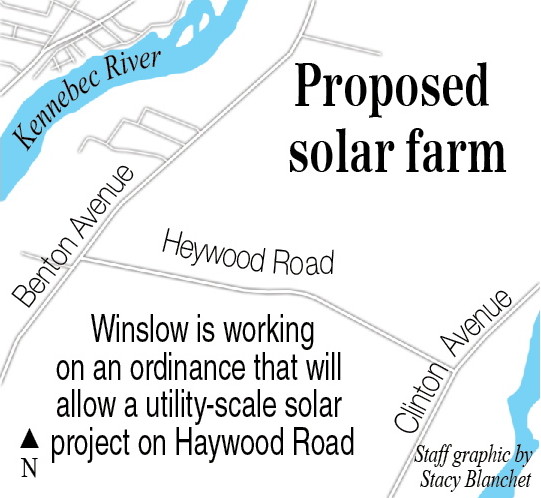WINSLOW — The town is set to begin drafting regulations that could pave the way for a solar farm that could be up to 20 times larger than the state’s current largest one.
Ranger Solar, a private Yarmouth-based energy firm, is contemplating siting a 10-to-20 megawatt solar station somewhere on Heywood Road. The project is estimated to cost as much as $25 million and take up as much as 100 acres.
Winslow would be the first municipality in the state to create a utility-scale solar ordinance that would set standards for such projects, according to town officials.
The ordinance would need to be in place by mid-October so Ranger can take advantage of federal solar investment tax credits.
In an interview Monday, Aaron Svedlow, Ranger’s director of environmental planning, said the project is still in the early stages.
“At this point, we are really just evaluating the feasibility of the project in Winslow,” he said.
The envisioned project is 10 to 20 times bigger than the largest solar farm in the state, at Bowdoin College in Brunswick. That installation, with 4,500 solar panels, generates 1.2 megawatts, roughly 8 percent of the college’s energy. It was completed in October.
Depending on how the Winslow project shapes up, Ranger is looking at 5 to 7 acres per megawatt, which translates to a development of 50 to 100 acres.
“That is what is required to make a solar project (work) economically without any grants or subsidies,” Svedlow said. He wouldn’t say where on Heywood Road the project would go, because a deal with the landowner hasn’t been finalized.
The plan is to connect the solar farm to the electricity grid and sell it commercially.
Svedlow also would not say where the electricity would be sold, saying that it is proprietary information.
According to the Solar Industries Association, the national average number of homes that can be powered by 1 megawatt of photovoltaic energy powers is 164, although that number varies from state to state.
The company wants to take advantage of federal solar investment tax credits before the end of the year. The program provides a 30 percent federal income tax credit for commercial or residential solar systems, but it will be stepped down to 10 percent after 2016.
To even consider the project, the town would have to adopt an ordinance that would set standards for such solar projects. The town’s zoning ordinance includes permitted and conditional land uses for each zone, such as residential, rural, industrial or mixed; but it doesn’t include any provisions for large-scale commercial solar projects.
Heywood Road is split evenly between a mixed-use zone to the west, where Johnny’s Seeds is located, and a rural zone to the east.
A committee made up of Planning Board members Mike Parker, Elery Keene, and Gary Owen and Councilors Ken Fletcher and Benjamin Twitchell will meet for the first time at 4 p.m. July 28 to begin discussions of the ordinance. Chris Huck, a planning director for the Kennebec Valley Council of Governments, will assist the panel.
Since they could find no other towns or cities in Maine with a solar utility ordinance, the committee is using ordinances from Connecticut, Massachusetts, North Carolina and elsewhere as a template, Huck said.
Occasionally, the town amends or updates its zoning ordinance to reflect a new business or industry the town didn’t expect when it was originally adopted, Town Manager Michael Heavener said.
The committee will determine standards, then decide what zones will be appropriate for large-scale commercial solar collection. The Town Council will consider the committee’s recommendations.
To meet its deadline, Ranger wants the ordinance in place by mid-October.
“That way, when they move forward with permitting, they have some assurance they can actually do the project at the site,” Heavener said.
Fletcher said Monday he didn’t think the ordinance will be too hard to draft and expected the committee could finish its work in time.
“It’s not the same as a large-scale manufacturing project,” Fletcher said. “Really, from the standpoint of the technology, it’s pretty straightforward.”
If the Winslow project goes through, it won’t likely be the last large-scale commercial solar proposal in the state.
“Maine has really lagged behind the nation and the U.S.” in pursuing solar energy, Svedlow said.
According to its website, Ranger Solar was founded by a group of veteran renewable energy developers looking to bring private investment in solar projects to the New England region. The company was started about six months ago.
If conditions are favorable, the company believes that solar presents a real opportunity in Maine, especially compared to wind power, which has been unpopular with some in the state.
“Everything is really pointing to solar being a good fit for Maine,” Svedlow said.
Peter McGuire — 861-9239
Twitter: PeteL_McGuire
Send questions/comments to the editors.





Comments are no longer available on this story